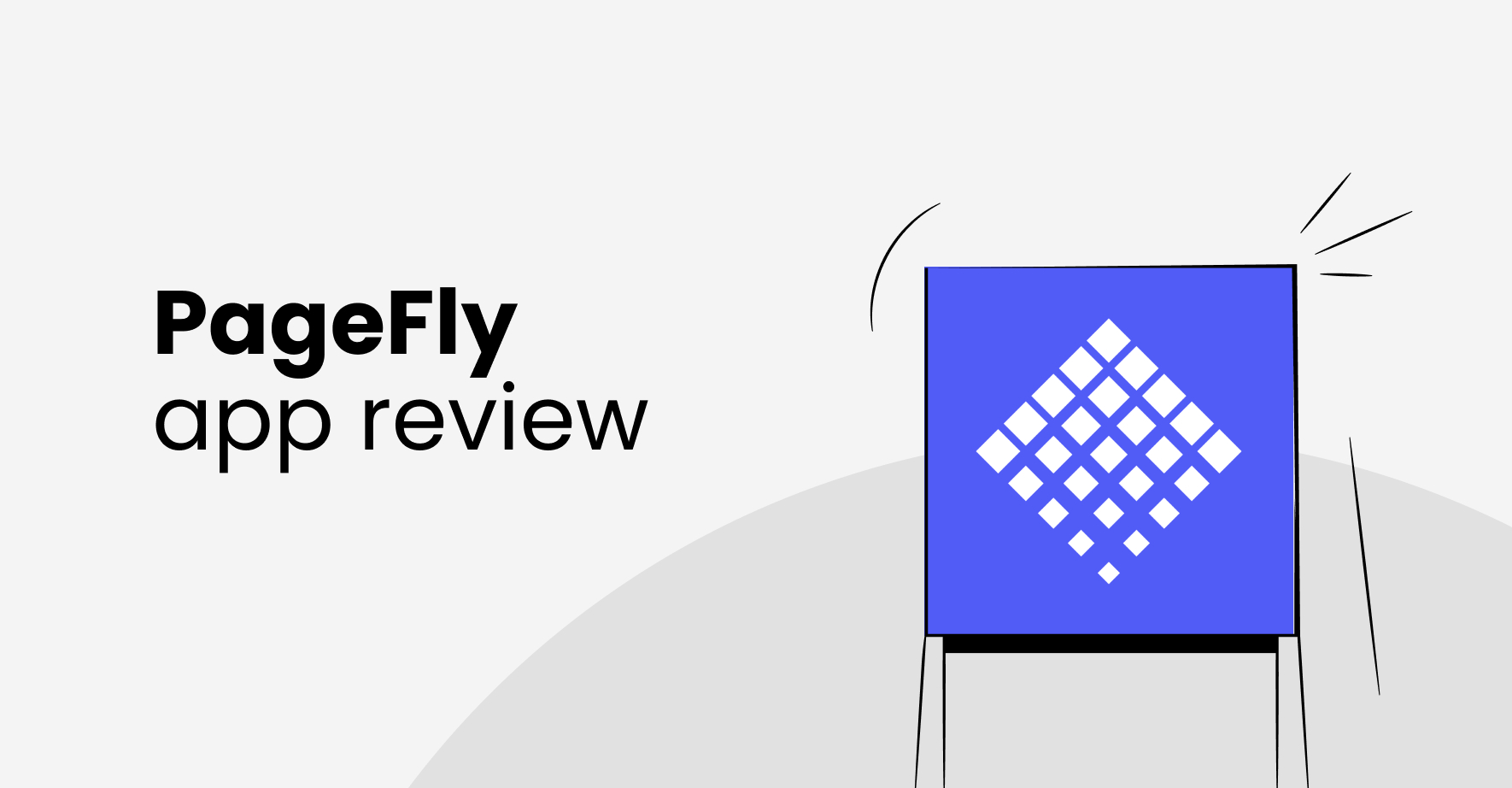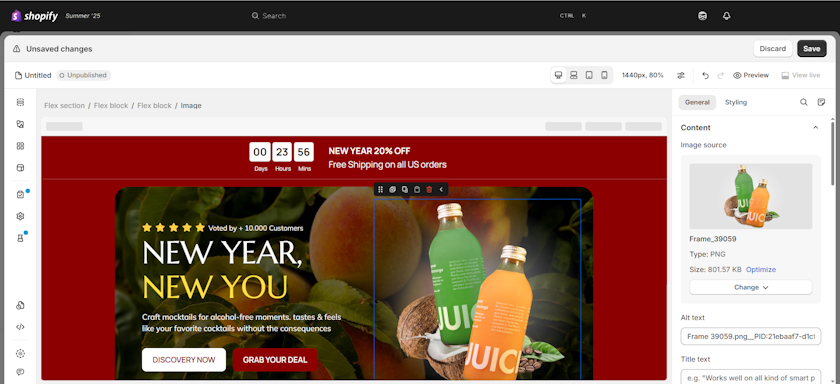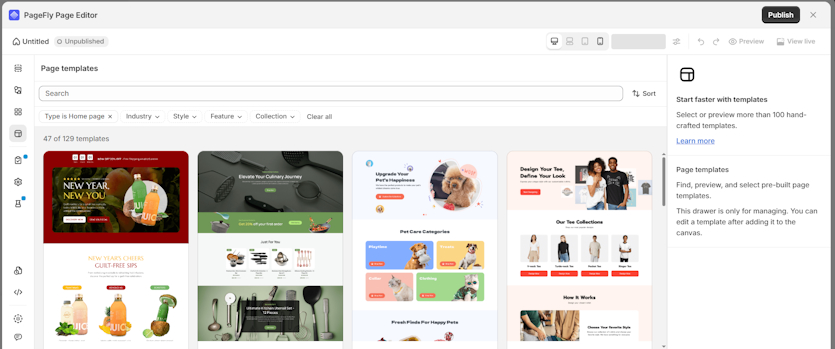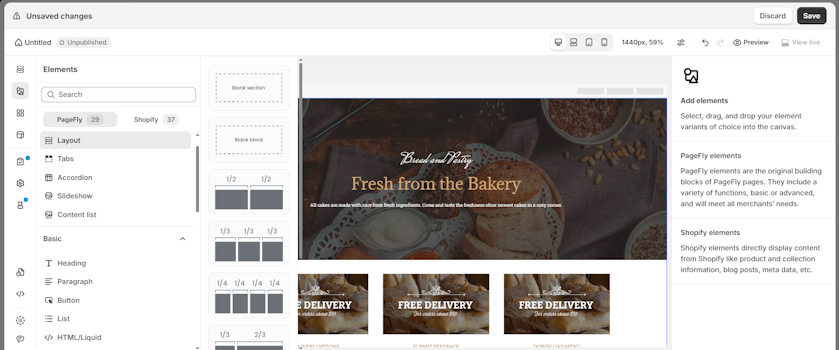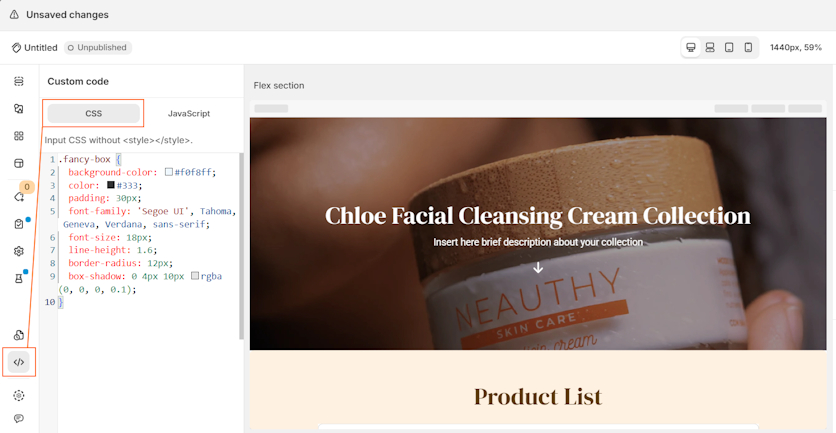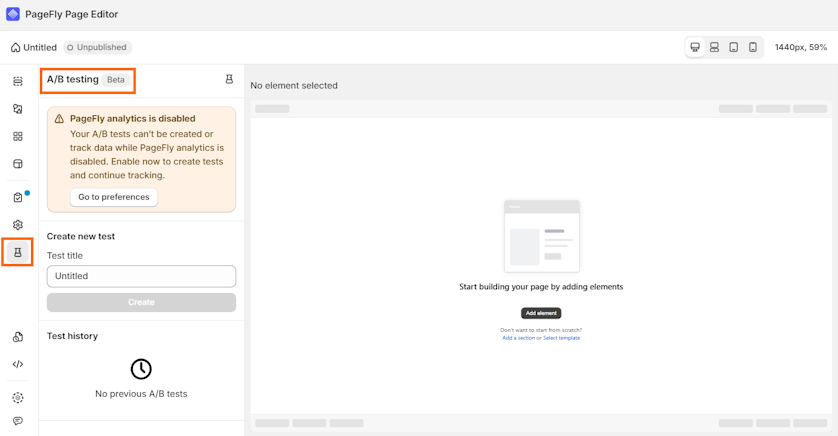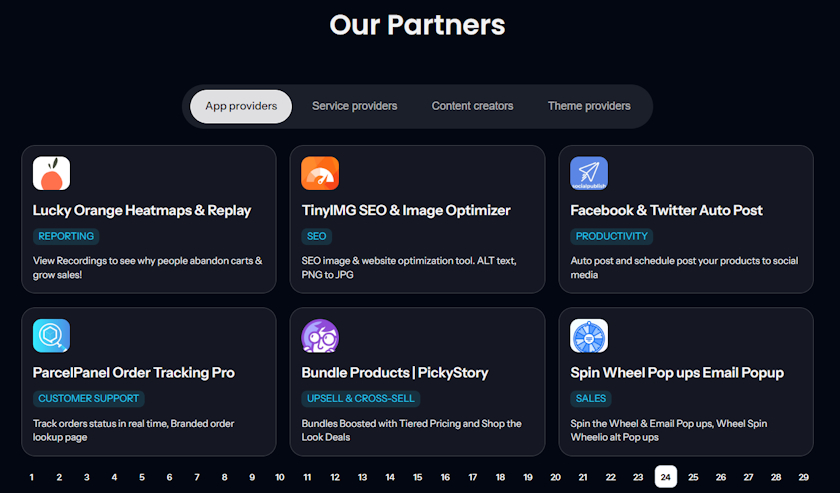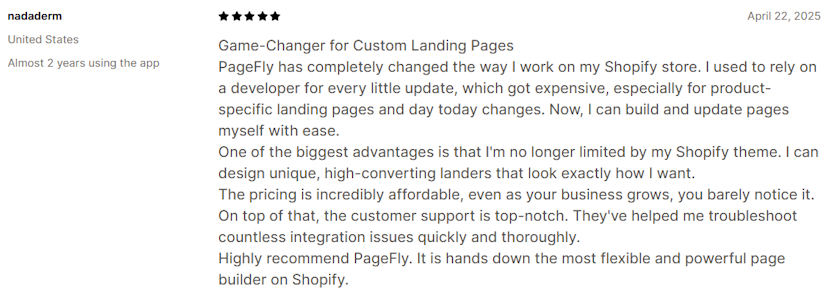PageFly is one of the most popular and highest-ranking page builder apps on the Shopify App store. It’s an intuitive drag-and-drop page builder that offers in-depth customizability to make your pages unique and professional.
PageFly even ranked as one of the best Shopify apps during our in-house tests for efficiency, support, and performance. Read our PageFly review where we answer all the questions about what the tool offers, its pros and cons, pricing, and more.
| Shopify rating | 4.9/5 |
| Trustpilot rating | 4.8/5 |
| Notable features | Drag-and-drop builder, mobile optimized, 120+ templates |
| Ease of use | Suitable for beginners |
| Pricing | Free, paid plans from $24/month |
| Install app | Install PageFly |
What is PageFly?
PageFly is a drag-and-drop page builder app for your Shopify store, allowing you to build various types of Shopify pages, like a homepage, collection and product pages, blogs, and landing pages.
With PageFly, you can build your website from scratch or use one of the 120+ templates to help you get started. You don’t need any coding knowledge – the only thing you need is a vision. This page builder gives you all the tools you need to configure all page elements to the smallest detail.
Founded in 2017, PageFly has become one of the most popular and well-received page builders for eCommerce websites.
PageFly app pros and cons
| PageFly Pros | PageFly Cons |
| ✔️ No-code drag and drop builder | ➖ Learning curve |
| ✔️ Mobile-friendly | ➖ Can be costly depending on the plan |
| ✔️ Wide app integration | |
| ✔️ Large selection of 120+ templates | |
| ✔️ Compatible with Shopify themes | |
| ✔️ Smooth performance | |
| ✔️ Fast 24/7 customer support |
We spent hours researching and testing PageFly and its features to write an unbiased and comprehensive review. If you’re interested, we also compared PageFly with GemPages and other competitors to find out its true strengths and weaknesses. Here’s a number of things we really liked about PageFly:
- We enjoyed its intuitive and powerful page editor. Not only can you flexibly add and edit elements, you can also add rows, columns, and other elements inside each section. This kind of functionality allows you to be more in control over your online store.
- Right in the page builder, you can also select what screen you want to build on – laptop, mobile, and tablet separately or all devices at once. You can choose whether you want PageFly to automatically optimize for mobile view, or create the design for mobile screens separately.
- A wide array of Shopify apps available for integration straight from the page builder. You can find all the popular apps, like the TinyIMG SEO optimizer, the DSers dropshipping tool, and other apps to increase conversions and boost engagement.
- Possibility to use PageFly on top of your existing Shopify theme, so you don’t have to rebuild your store from scratch. You can freely use PageFly’s flexible page editor to add and arrange elements in your store.
- With PageFly, you can get your desired design results without dabbling in code because the app allows you to customize elements to the smallest details.
We were really impressed with PageFly, but it does have some shortcomings.
- Higher paid plan price. Although there’s a free plan you can use to publish one page, 5 pages will cost you $24/month, while unlimited pages can go as high as $99/month.
PageFly features
Let’s explore some of the most prominent PageFly app features:
- Page templates
- Drag-and-drop page builder
- Analytics
- A/B testing
- Integrations
Page templates
PageFly offers 120+ professional templates that are designed to boost conversions. You can use templates for seasonal sales pages, landing pages, homepages, product and collection pages.
What makes PageFly great is that you can customize elements on your pages to the smallest detail. You can change button sizes and colors, attract users with animations, add accordion sections, and many other features that allow you to personalize your Shopify store and create a truly professional look.
Drag-and-drop page builder
PageFly has a visual drag-and-drop page builder which allows you to add, edit, and remove sections or elements and see changes in real time. It’s a powerful feature that requires no coding knowledge.
With PageFly, you can create and reuse section templates, and place them across various pages on your website. For example, a section that calls visitors to subscribe to a newsletter might be useful on a homepage and in collection pages.
You can also create your own elements and save them to use on other pages. It not only saves you time but also gives your store a cohesive look across all pages.
And if you’re comfortable with coding, you can use advanced styling options to edit the CSS code.
Analytics
PageFly has a separate analytics section that allows you to track how your pages perform. The app tracks such metrics as conversion rate, product views, visitor count, sessions, and revenue.
In the dashboard, you’ll see separate sections for different pages on your website, i.e., home page, product pages, collection pages, blog posts, and password pages.
A/B testing
PageFly has implemented an A/B testing feature (currently in beta), letting you find the best version of your pages. The feature lets you run experiments and uses real data to find out what brings your store the best results.
The way it works is that PageFly shows two versions of the same page to different website visitors. Then, it compares real data of both page versions to find out which gets your store more conversions.
All you need to do to get started is connect your Google Analytics account.
Integrations
PageFly is compatible with many leading Shopify apps that help you scale your business. The available apps offer tools for collecting, importing, and displaying product reviews, incorporating upsell and cross-sell features, growing your email marketing efforts, and more.
You can find the featured apps and the full list of the app’s partners straight on the PageFly app dashboard.
PageFly customer support
| 24/7 live chat | ✔️ |
| ✔️ | |
| Knowledge base | ✔️ |
| YouTube tutorials | ✔️ |
| Facebook community | ✔️ |
PageFly offers a 24/7 customer support live chat even for users on a Free plan. If you have questions or an issue you need help resolving, you’ll get a quick reply and won’t have to wait hours or days.
If you have a basic issue, you can also look through Pagefly’s help center or YouTube channel. You’ll find tutorials on how to get started, use Page Analytics, set up a countdown timer, and many more guides. Alternatively, you can join their Facebook community for more support.
PageFly pricing review
PageFly has flexible pricing options depending on how many pages you want to edit. The free plan gives you all app features but only lets you publish one page. The paid plans start from $24/month for 5 pages, and the price increases if you publish more.
Here’s an overview of what you get with PageFly’s plans:
| Free | Pay as you go | Unlimited | |
| Price | – | From $24/month to $69/month | $99/month ($82.5/month if annual plan) |
| Published pages | 1 | From 5 to 50 | Unlimited |
| All app features | Yes | Yes | Yes |
| 24/7 live chat support | Yes | Yes | Priority |
| Video call support | No | No | Yes |
| Unlimited tracking sessions | No | No | Yes |
| Speed optimization support | No | No | Yes |
| Unlimited blog post pages | $49/month | $49/month | Free |
If you want to customize your whole site using PageFly, you can get the Unlimited plan for $99/month or $82.5/month if paid annually. It allows publishing unlimited pages, whether it’s product, collection, home, or blog post pages. Plus, you get priority support to solve issues as soon as possible.
Overall, while PageFly can be pricey, its pricing system is flexible, allowing anyone to find the right plan for their store.
How does PageFly compare to Shopify themes
The best Shopify themes offer a wide range of capabilities, unique features, and professionally designed templates to suit different store needs. While there is plenty to choose from when it comes to Shopify themes, PageFly still comes out on top when it comes to functionality, features, and flexibility.
| PageFly | Shopify themes | |
| Unlimited customization | Yes | No |
| Clean code | Yes | Yes |
| Analytics | Yes (Advanced) | Yes (Basic) |
| Templates | 120+ templates | May have a few presets available |
| Ease of use | Has a learning curve | Beginner-oriented |
One of the biggest PageFly advantages is that the app offers almost unlimited customization possibilities, allowing you to customize elements to the smallest detail. Shopify, on the other hand, relies more on the pre-designed page templates that don’t have a lot of customization options.
For example, you can edit button sizes, colors and styles with PageFly. It’s a small detail but it can make a huge difference in conversions.
Another advantage is clean and optimized code – pages built with PageFly can have slightly better loading speeds than those built with the default Shopify Page Builder.
Generally, Shopify themes are a good choice for those who don’t want to spend time customizing their websites and are happy with the designs that this eCommerce platform offers. But remember that you don’t have to choose one or the other because PageFly can be used together with Shopify themes to maximize your website-building efforts.
PageFly client reviews
PageFly users praise the app’s ease of use, beautiful elements and templates, and are happy with the control they have over their store’s design. There’s also some praise for the page editor. One reviewer says that you don’t need any coding knowledge but it does help with understanding different properties of page elements.
Reviewers also say that the app’s interface blends seamlessly with the existing Shopify interface. And, even though the app takes some time to get used to, it quickly becomes extremely easy and intuitive to navigate.
Another common sentiment is that PageFly really delivers where Shopify lacks, and that they would not be able to build a site they want without PageFly.
On the other side, there are some concerns that the users raise. Some people have issues with bugs, some wish there were more features, like the Search & Filter functionality. However, all reviewers praise customer support for their efforts in helping solve those issues.
Overall, looking at the reviews, it seems apparent that the team at PageFly are very swift in responding to users’ concerns, which signals that the app developers are keen on making the app better.
PageFly review summary
PageFly is one of the best tools for page building on Shopify. It comes with a drag-and-drop page builder that helps you create captivating and high-converting pages.
During our tests, we found that PageFly offers a wide array of features, including 120+ templates, dozens of integrations, analytics, and even A/B testing. Although there’s a small learning curve associated with using this app, it’s worth it for merchants who want extensive customization options and exceptional support.
Overall, PageFly is a valuable tool for Shopify merchants seeking to enhance their online store's design and functionality.
Frequently asked questions
Yes, PageFly has a free plan that lets you publish one page or section while leveraging all app features. Even free users can take advantage of the 24/7 support. However, the plan is limited to one page or section, so if you need more, you’ll have to invest in a paid plan, starting from $24/month.
PageFly provides you with a simple way to customize any of your Shopify store pages more in-depth than the regular Shopify theme editor. While it can feel on the pricier side, it’s worth it if you want to create unique pages without coding.
You don’t need a Shopify theme to use PageFly. However, if you’re already using a Shopify theme, you can use the PageFly app on top of it. PageFly has a lot of elements and sections that Shopify doesn’t, so it’s a great companion to your Shopify theme.
